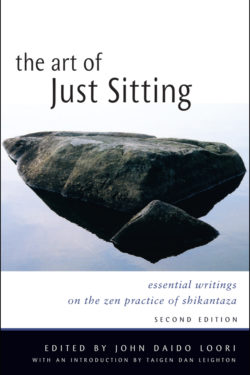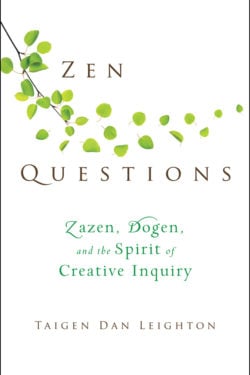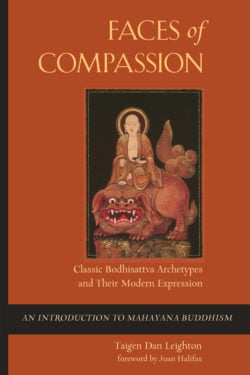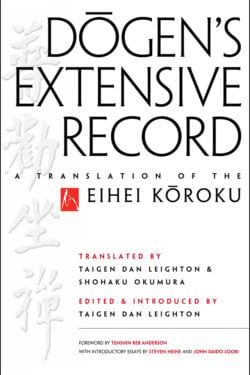Taigen Dan Leighton
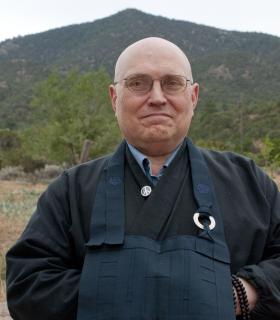
Taigen Dan Leighton, Soto Zen priest and successor in the Suzuki Roshi lineage, received Dharma Transmission in 2000 from Reb Anderson Roshi and is Dharma Teacher at Ancient Dragon Zen Gate in Chicago. After residing for years at San Francisco Zen Center and Tassajara monastery, Taigen also practiced for two years in Kyoto, Japan. Taigen is author of Zen Questions: Zazen, Dōgen, and the Spirit of Creative Inquiry; Faces of Compassion: Classic Bodhisattva Archetypes and Their Modern Expression; and Visions of Awakening Space and Time: Dogen and the Lotus Sutra. He has edited and co-translated several Zen texts including: Dōgen’s Extensive Record: A Translation of Eihei Koroku; Cultivating the Empty Field: The Silent Illumination of Zen Master Hongzhi; Dōgen’s Pure Standards for the Zen Community; and The Wholehearted Way; and has contributed to many other books and journals. Taigen teaches online at Berkeley Graduate Theological Union, from where he has a PhD. He has taught at other universities including Saint Mary’s College, the California Institute of Integral Studies, and in Chicago at Meadville Lombard Theological Seminary and Loyola University Chicago. Taigen has long been active in social justice programs, including Peace and Environmental Activism.
Books, Courses & Podcasts
The Art of Just Sitting
Shikantaza—or “just sitting”—is one of the simplest, most subtle forms of meditation, and one of the most easily misunderstood. This peerless volume brings together a wealth of writings, from the Buddha himself to Bodhidharma and Dogen and many of modern Zen Buddhism’s most influential masters, all pointing directly to the heart of this powerful practice. Edited by one of America’s pre-eminent Zen teachers, this book is a rich resource for wisdom seekers and scholars alike.
Zen Questions
Whether speaking of student or master, Zen hinges on the question. Zen practice does not necessarily focus on the answers, but on finding a space in which we may sustain uncertainty and remain present and upright in the middle of investigations. Zen Questions begins by exploring “The World of Zazen,”—the foundational practice of the Zen school—presenting it as an attitude of sustained inquiry that offers us an entryway into true repose and joy. From there, Leighton draws deeply on his own experience as a Zen scholar and teacher to invite us into the creativity of Zen awareness and practice. He explores the poetic mind of Dōgen with the poetry of Rumi, Mary Oliver, Gary Snyder, and even “the American Dharma Bard” Bob Dylan. What’s more, Leighton uncovers surprising resonances between the writings of America’s Founding Fathers—including Thomas Jefferson and Ben Franklin—and the liberating ideals at the heart of Zen.
Faces of Compassion
2013 Nautilus Book Award — Gold Medal in Religion/Spirituality — Eastern
Faces of Compassion introduces us to enlightened beings, the bodhisattvas of Buddhist lore. They’re not otherworldly gods with superhuman qualities but shining examples of our own highest potential. Archetypes of wisdom and compassion, the bodhisattvas of Buddhism are powerful and compelling images of awakening. Scholar and Zen teacher Taigen Dan Leighton engagingly explores the imagery and lore of the seven most important of these archetypal figures, bringing them alive as psychological and spiritual wellsprings.
Emphasizing the universality of spiritual ideas, Leighton finds aspects of bodhisattvas expressed in a variety of familiar modern personages—from Muhammad Ali to Mahatma Gandhi, from Bob Dylan to Henry Thoreau, and from Gertrude Stein to Mother Teresa. This edition contains a revised and expanded introduction that frames the book as a exciting and broad-scoped view of Mahayana Buddhism. It’s updated throughout to make it of more use to scholars and a perfect companion to survey courses of world religions or a 200-level course on Buddhism.
Dōgen’s Extensive Record
Eihei Dōgen, the thirteenth-century Zen master who founded the Japanese Sōtō School of Zen, is renowned as one of the world’s most remarkable religious thinkers. As Shakespeare does with English, Dōgen utterly transforms the language of Zen, using it in novel and extraordinarily beautiful ways to point to everything important in the religious life.
He is known for two major works. The first work, the massive Shōbōgenzō (Treasury of the True Dharma Eye), represents his early teachings and exists in myriad English translations; the second work, the Eihei Koroku, is a collection of all his later teachings, including short formal discourses to the monks training at his temple, longer informal talks, and koans with his commentaries, as well as short appreciatory verses on various topics. The Shōbōgenzō has received enormous attention in Western Zen and Western Zen literature, and with the publication of this watershed volume, the Eihei Koroku will surely rise to commensurate stature.
Dōgen’s Extensive Record is the first-ever complete and scholarly translation of this monumental work into English and this edition is the first time it has been available in paperback. This edition contains extensive and detailed research and annotation by scholars, translators and Zen teachers Taigen Dan Leighton and Shohaku Okumura, as well as forewords by the eighteenth-century poet-monk Ryokan and Tenshin Reb Anderson, former abbot of the San Francisco Zen Center—plus introductory essays from Dogen scholar Steven Heine, and the prominent, late American Zen master John Daido Loori.

